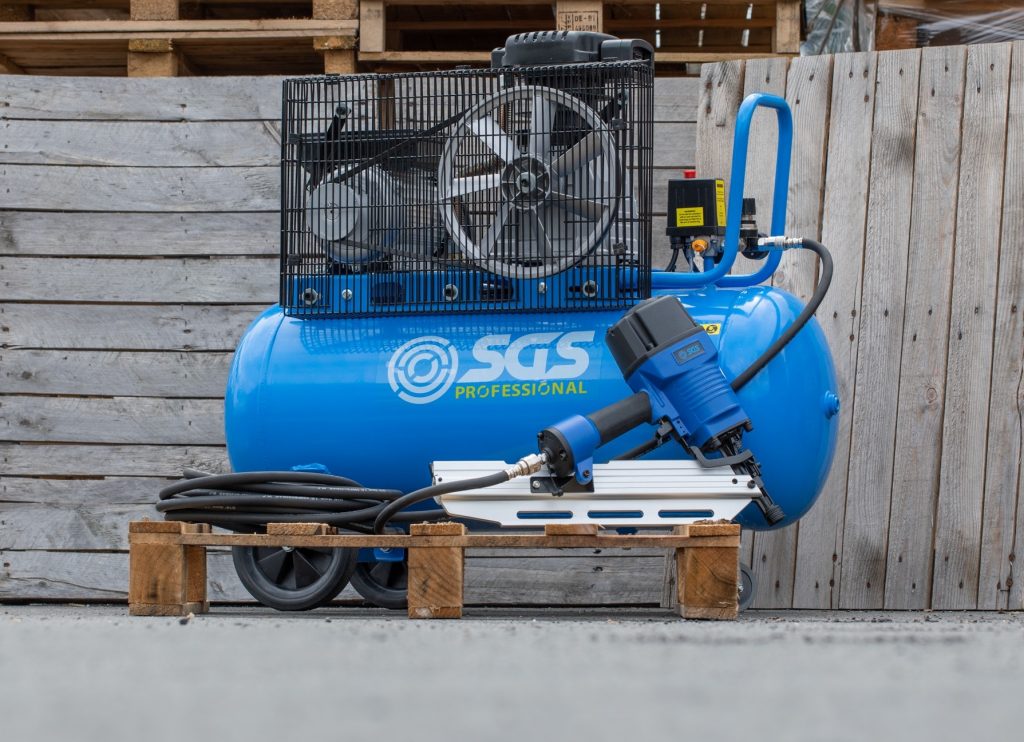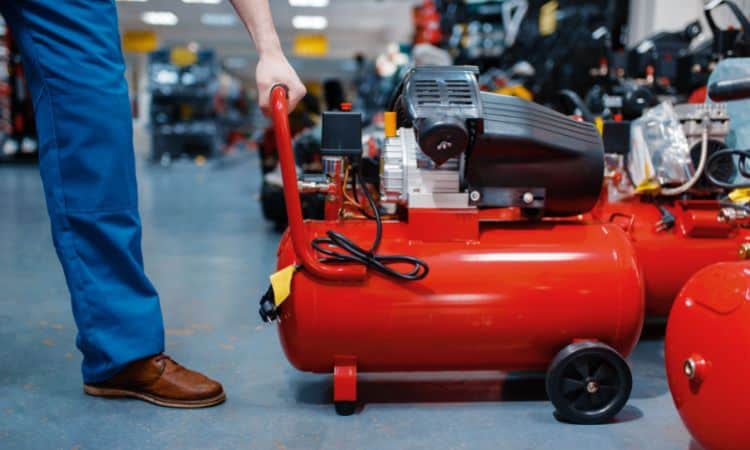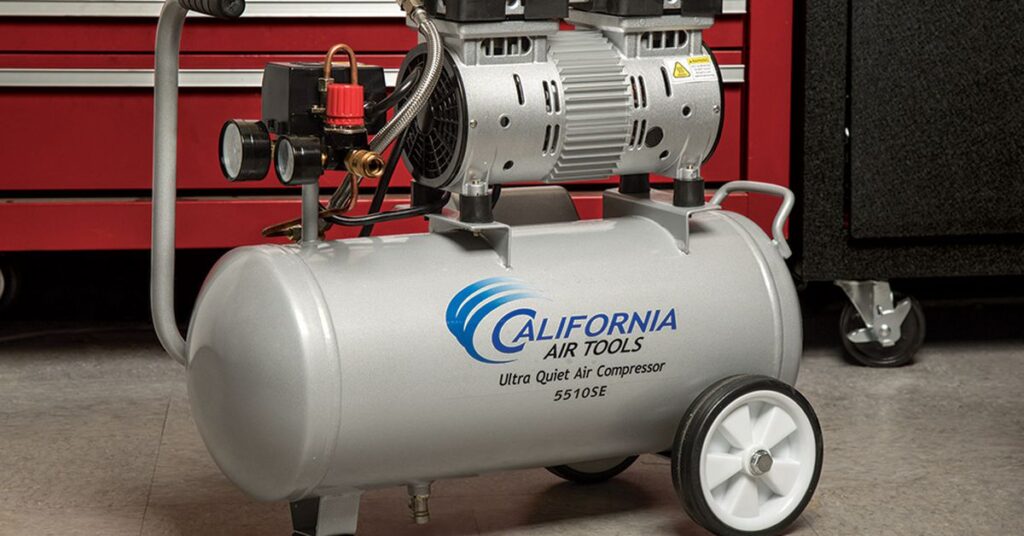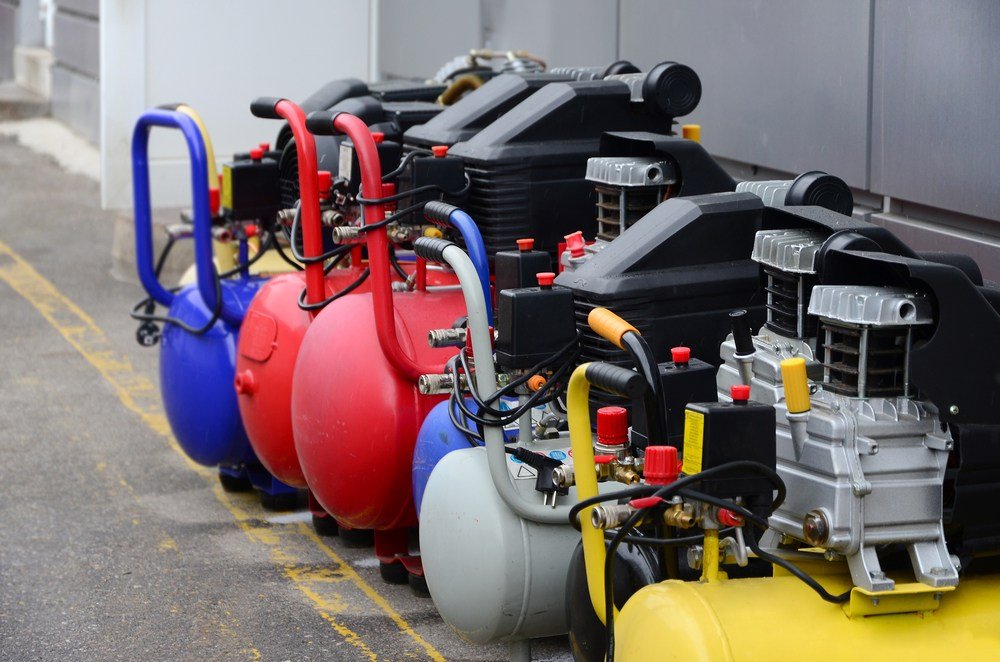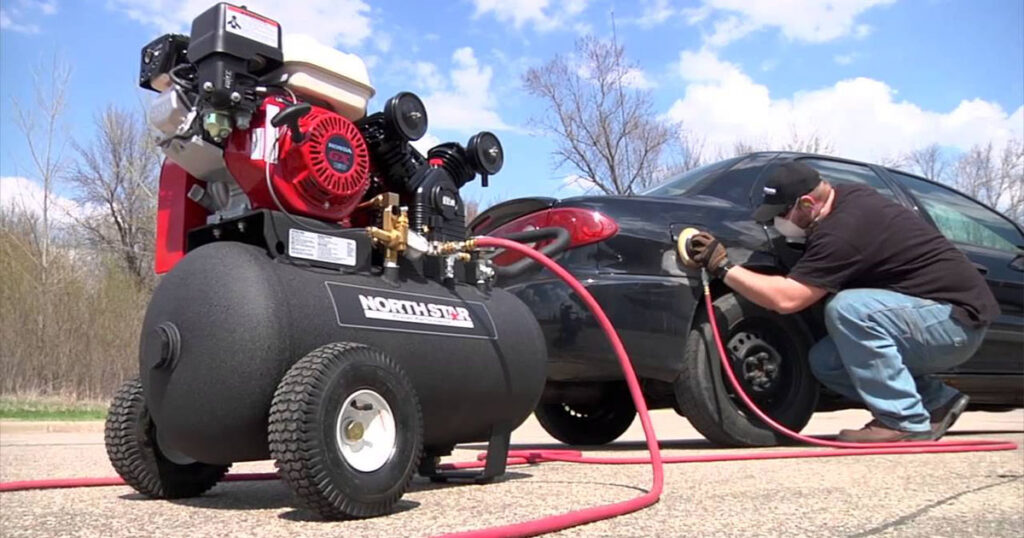There are four main categories of air compressors, i.e., rotary, reciprocating, centrifugal, and axial. Under these categories, you find options like single-stage and dual-stage, helical screw compressors, scroll, lobe, liquid ring and other air compressors. All these options are used in various industries, including pharmaceutical, food and beverage, chemical etc. Some are used at home for power generation for pneumatic tools like paint sprayers.
However, all these options have in common that they’re either oil-lubricated or oil-free. For people unfamiliar with air compressors but looking into getting one, this raises the question of suitability for the types of jobs they have in mind. They may also wonder whether it makes a difference in choosing an option. Read on for details on how the two types of air compressors differ.
Whether it’s a single-stage, dual-stage, scroll, or another type of compressor, these machines have moving parts. In the case of single and dual-stage compressors, for instance, the compression chamber consists of several moving parts. These include a reciprocating piston and the inlet and outlet valve.
The piston moves down, and the inlet valve opens to let air in. As the piston moves back up, it compresses the air and forces the outlet valve open. This allows the compressed air to be moved to the storage tank in readiness for the next cycle of atmospheric air to enter the compression chamber.
Rotary screw compressors, on the other hand, are designed with dual-mated rotors. According to Natural Resources Canada, Trusted Source Air Compressor Types and Controls Air Compressor Types and Controls. www.nrcan.gc.ca as these motors mesh together, they reduce the air volume along the rotors. The resulting compressed air can then go into storage.
With all these parts, there’s bound to be some friction which can lead to significant wear and tear. Of course, since oil is typically used as a lubricant in other machines, including vehicles, there’s no reason it can’t be used in air compressors. The oil keeps the moving elements of the machine running smoothly and even helps dissipate the heat.
In an oil lube air compressor vs oil-free comparison, the latter doesn’t use oil as a lubricant. Instead, it comes with a pre-lubricating material, e.g., Teflon, attached to the moving components. As such, it can achieve almost similar efficiency levels and functionality without needing extra lubricant. In rare cases, you may find some oil-free air compressors using water as the lubricant of choice.
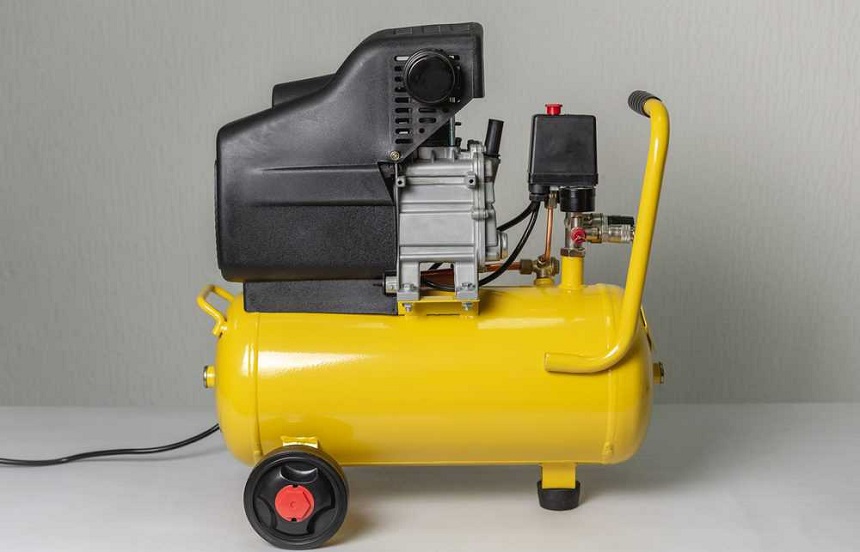
As mentioned above, compression chambers are fitted with several moving parts, like pistons and valves. As such, when the pistons and valves move up and down, they rub against other parts of the chamber. Typically, this would mean a lot of friction between the moving parts and the chamber. This would lead to significant wear and tear, making the machine unusable unless you reduce the friction.
With oil-flooded air compressors, users introduce oil as a lubricant to reduce friction. This reduces the wear and tear left by each compression cycle. Furthermore, it has the extra advantage of cooling the piston and the compressed air, which heats up during the process.
Like all other machines that use oil as a lubricant, some maintenance is required. You’d need to check the oil levels regularly, change the filters, and even change the oil if it’s gone bad. That said, the superior lubrication levels make them ideal for industrial use.
Fortunately, we’ve outlined some of the best industrial air compressors as examples of what to expect with oil-flooded air compressors. Additionally, they can be durable, rugged, and heavy so moving them often proves an impossible task.
On the other end of the oil-free vs oil-flooded air compressor discussion is the oil-free option. According to GAHL Trusted Source Oil free air compressors Oil free air compressors. 5.imimg.com , they work under the same principles as oil-flooded compressors. Nonetheless, while they may have oil lubricating other machine components, none of this oil gets near the compression chamber. Instead, they use alternatives like Teflon or water to prevent oil contamination.
Omnexus Trusted Source Polytetrafluoroethylene (PTFE) - Uses, Structure & Material Properties Polytetrafluoroethylene or PTFE is a versatile, high-performance fluoropolymer. Explore its key properties, processing guide, popular applications & limitations. omnexus.specialchem.com notes that some of the characteristics of Teflon that make this possible include the Low coefficient of friction, availability of high-purity grades, the resistance to heat, etc.
Nevertheless, neither Teflon nor water can work as well as oil. As such, the first compression round compresses the air to 2.5 bar and heats the air to about 180°F, which is more than the heat you get from oil-flooded compressors.
Notably, most oil-free compressors can’t provide full compression in one go. This is because there would be too much friction, and combined with the heat of the compressed air, the risk of a fire is likely. Consequently, these devices are designed as multi-stage compressors. That said, in between the stages, the compressed air goes through intercoolers.
In addition to the difference in construction components, you can have single-stage oil-flooded air compressors. This is different for oil-free compressors since they’re trying to minimize the heat generation per compression cycle as much as possible.
Additionally, you’ll find that most oil-free compressor manufacturers will use low horsepower and slower running motors to reduce friction. This also helps reduce noise production in the machine.
Lastly, oil-lube compressors can often be used in most industries, while their oil-free counterparts are used in fields where even a tiny bit of oil carryover is a problem. These include options like pharmaceuticals and food and beverages. After all, no one wants oil contamination in their drinks or prescribed drugs.
So what are some major pros and cons of oil-free vs regular air compressors?
If you were to get an oil-free air compressor, you would have to deal with lots of noise. After all, sound is a by-product of vibrations caused by friction. Since oil-free compressors have a lot of friction, they make much more noise than their oiled counterparts.
Nevertheless, this isn’t as bad as it sounds. Modern technologies have allowed the use of dual-piston pumps and sound-reducing technology, among other things, to make the noise produced less apparent. Additionally, such compressors shouldn’t be a problem for buyers who have a big facility and don’t mind the extra noise.
If you’d still rather have less noise in your garage or workshop, you can use an oil-lubed compressor instead. You can find out which brands produce the best garage air compressors for your type of use scenarios, whether it’s inflating tires or something else.
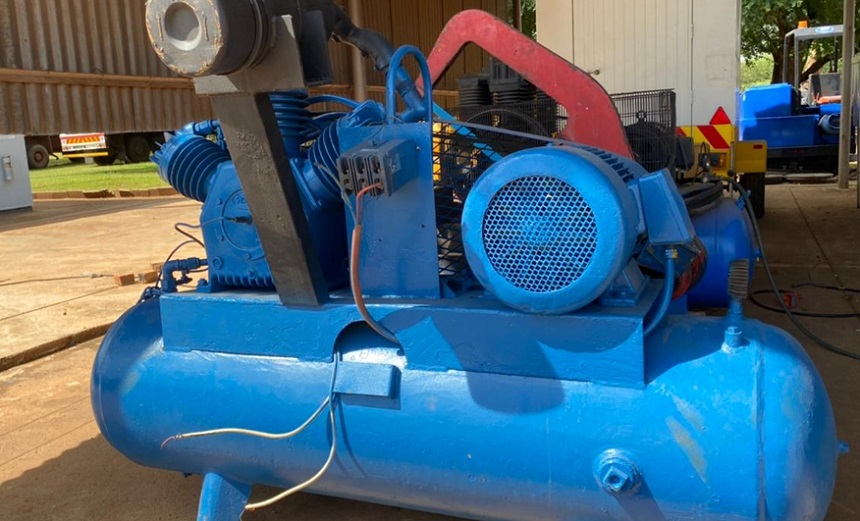
Maintenance is one area where the oil lubricated air compressor vs oil free goes the way of the latter. With the oil-lubricated compressor, it’s necessary to ensure that the machine is well-lubricated at all times. This includes checking on the freshness of the oil, refilling it when necessary, and even changing it from time to time.
These are the same maintenance processes you have for other oil-lubricated pieces of machinery like your vehicle or the bike you use for exercise.
In contrast, oil-free air compressors are virtually maintenance-free. They may have lubricant coating on the moving parts, or you can use water depending on the make and model. As such, there’s no clean-up or regular checkups necessary. Furthermore, with the intercoolers as part of the setup, the machines can cool the compressed air without much fuss.
As for air contamination, it’s part and parcel of using an oil-lubricated air compressor. According to Chemical Processing Trusted Source 6 Tips To Effectively Remove Contaminants From Compressed Air Consider these common myths and tips for filtration that also minimize leakage. www.chemicalprocessing.com , lubricant, which in this case means oil, can leach from oil-flooded compressors. After all, the oil is even used to lubricate the moving components in the compression chamber.
Often manufacturers indicate how much oil carryover there will be with a particular compressor. With that, buyers can decide whether it works for their project or not. Some even invest in filtration or separation options down the line once the air has already been compressed. However, it’s hard to remove all the oil once it has mixed in with the compressed air.
Additionally, in some situations, such as in the pharmaceutical or food industries, purity is essential and may even affect the final product negatively or cause spoilage. In such cases, buyers have no choice but to get oil-free compressors.
Durability-wise, it’s hard to argue against oiled air compressors. The reduced friction can only mean one thing: the internal components of the compression chamber take on less damage with each compression cycle. Also, these machines are more efficient. This is evident in that you don’t need as many compression cycles for full compression.
Conversely, you need multiple stages with cooling sessions in between to get full compression in an oil-free air compressor. This can take a toll on the overall device. However, just like the sound, the amount of friction has been greatly reduced in recent models, with the durability of these machines increasing significantly as well.
The cost of either type of air compressor can be broken down into initial costs and operation costs. Initial costs go the way of oil-lubricated air compressors since they’re designed with fewer components. In comparison, oil-free compressors need intercoolers, several compression chambers, pre-lubricating materials, and other components.
On the other hand, oil air compressors need to be lubricated regularly. Consequently, the cost of buying and replacing oil and even keeping up with maintenance over the years can rise over the years.
However, another point in favor of the oil-lubricated air compressors is that you won’t have to be replacing them soon if you keep up the maintenance. Conversely, oil-free options may have a relatively short lifespan if used comprehensively.
Both types of compressors can be great depending on intended usage as well as other factors. For instance, size may come into play. You may want something compact, while others wouldn’t mind a compressor that takes up a lot of space. We’ve outlined some of the best portable air compressors for those whose needs involve moving around with the machine.
Something like air contamination also introduces other issues. You’d need to buy extra equipment to cater to removing the oil from the compressed air, raising the overall costs. These are costs that oil-free compressor buyers don’t have to worry about. This filtration can also affect compressed air flow, resulting in a pressure drop.
However, if it doesn’t matter whether the compressed air is contaminated and you don’t mind the pressure drop, it may not be a big deal.
